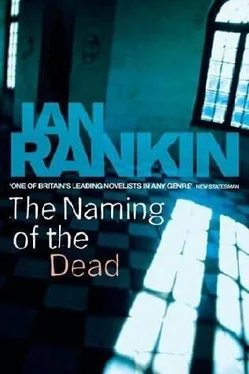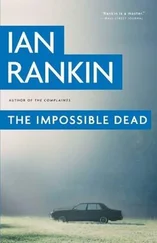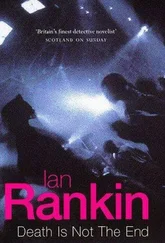“All right, I will. You can turn the Elbow CD up now.”
“Well spotted. Talk to you later.”
Rebus cut the connection and did as he was told.
The barriers were going up. Down George IV Bridge and all along Princes Street, workmen were busy putting them in place. Road repairs and building projects had been put on hold, scaffolding removed so it couldn’t be taken apart and used as missiles. Mailboxes had been sealed shut and some shops boarded up. Financial institutions had been warned, staff advised not to wear formal clothing-it would make them easy targets. For a Friday evening, the town was quiet. Police vans cruised the central streets, metal grilles fixed to their windshields. More vans were parked out of sight in unlit side roads. The cops on board wore riot gear and laughed among themselves, swapping stories from previous engagements. A few veterans had seen action during the last wave of miners’ strikes. Others tried to match these memories with stories of soccer battles, poll-tax demonstrations, the Newbury Bypass. They exchanged rumors about the expected size of the Italian anarchist contingent.
“ Genoa toughened them up.”
“Just the way we like it, eh, lads?”
Bravado and nerves and camaraderie. The talk faltering whenever a radio crackled to life.
The uniformed police working the train station wore bright yellow jackets. Here, too, barriers were being erected. They were blocking exits, so there remained a single route in and out. Some officers carried cameras with which to record the faces of arrivals from the London trains. Special cars had been added on for the protesters, which made them easy to identify. Not that such skills were really needed: they sang songs, carried backpacks, wore badges and T-shirts and wristbands. They carried flags and banners, were dressed in baggy pants, camouflage jackets, hiking boots. Intelligence reports said busloads had already left from the south of England. First estimates had stated fifty thousand. The latest guess was north of a hundred thousand. Which, added to the summer tourists, would swell Edinburgh ’s population nicely.
Somewhere in the city there was a rally signaling the start of G8 Alternatives, a weeklong series of marches and meetings. More police would be there. If needed, some of these would be on horseback. Plenty of dog handlers, too, including four on Waverley Station’s concourse. The plan was simple: visible strength. Let any potential troublemakers know what they’d be dealing with. Visors and billly clubs and handcuffs, horses and dogs and patrol vans.
Force of numbers.
Tools of the trade.
Tactics.
Earlier in its history, Edinburgh was prone to invasion. Its inhabitants hid behind walls and gates, and when those were breached they retreated to the warrenlike tunnels below the castle and the High Street, leaving the city empty and the victory hollow. It was a talent the denizens continued to bring to the annual August festival. As the population swelled, the locals became less visible, blending in to the background. It might also explain Edinburgh ’s reliance on invisible industries such as banking and insurance. Until lately, it was said that St. Andrew Square was the richest in Europe, boasting several corporate HQs. But with space at a premium, new building projects had prospered on Lothian Road and farther west toward the airport. The Royal Bank’s HQ at Gogarburn, recently completed, was seen as a target. So, too, buildings owned and staffed by Standard Life and Scottish Widows. Driving through the streets, killing some time, Siobhan figured the city would be tested in the coming days as never before.
A police convoy, sirens blaring, pulled out to pass her. No mistaking the schoolboy grin on the driver’s face; he was loving every minute. Edinburgh provided his own personal racetrack. A purple Nissan filled with local youths was riding the slipstream. Siobhan gave it ten seconds, then signaled to move back out into the flow of traffic. She was on her way to a temporary campsite in Niddrie, one of Edinburgh ’s less genteel areas. Instead of pitching their tents in people’s gardens, marchers were being told to go there.
Niddrie.
The council had chosen the grasslands around the Jack Kane Center. They were planning for ten thousand visitors, maybe even fifteen. Portable toilets and showers had been provided and a private security firm put in charge. Probably, Siobhan couldn’t help thinking, to keep the neighborhood gangs out rather than the marchers in. The local joke was that there’d be a lot of tents and camping gear for sale around the pubs in the next few weeks. Siobhan had offered to let her parents stay at her place. Of course she had: they’d helped her buy it. They could have her bed; she’d crash on the sofa. But they’d been adamant: they would be traveling by bus and camping with the others. They’d been students in the 1960s and had never quite shaken themselves free of the period. Though now nearing sixty-Rebus’s generation-her dad still kept his hair tied back in a sort of ponytail. Her mum still wore dresses that were mostly caftans. She thought of her words to Rebus earlier: You’re just the sort of cop they’re afraid I’ll become. Thing was, part of her felt now that she’d joined the police mostly because she’d thought they wouldn’t approve. After all the care and affection they’d doled out, she’d needed to rebel. Payback for the times their teaching jobs had led to yet another move, another new school. Payback simply because it was in her power. When she’d told them, their looks had almost made her recant. But that would have been weak. They’d been supportive, of course, while hinting that police work might not be the most fulfilling use of her skills. That was enough to make her dig in her heels.
So she’d become a cop. Not in London, where her parents lived, but in Scotland, which she hadn’t really known at all until attending college there. One final heartfelt plea from her mum and dad: “Anywhere but Glasgow.”
Glasgow, with its hard-man image and knife culture, its sectarian divide. Yet, as Siobhan had found, a great place to shop. A place she sometimes went with friends-all-girl parties which led to them staying the night at some boutique hotel or other, sampling the nightlife, steering clear of any bars with bouncers at the door-a point of drinking protocol on which she and John Rebus agreed. While Edinburgh, meantime, had proved more deadly than her parents could ever have imagined.
Not that she would ever tell them that. During Sunday phone calls she tended to brush off her mum’s inquiries, asking her own questions instead. She’d offered to meet them at the bus, but they’d said they would need time to get the tent ready. Stopped at traffic lights, she pictured this, and the image made her smile. Nearly sixty, the pair of them, and messing around with a tent. They’d taken early retirement the previous year from their teaching jobs. Owned a fair-sized house in Forest Hill, the mortgage paid off. Always asking her if she needed money…
“I’ll pay for a hotel room,” she’d told them on the phone, but they’d remained resolute. Pulling away from the lights, she wondered if it might be some form of dementia.
She parked on the Wisp, ignoring the orange traffic cones, and stuck a POLICE BUSINESS notice on her windshield. At the sound of her idling engine, a yellow-jacketed security guard had come for a look. He shook his head and pointed at the notice. Then he drew a hand across his throat and nodded toward the nearest housing development. Siobhan removed the sign but left the car where it was.
“Local gangs,” the guard was saying. “Sign like that’s a red rag to a bull.” He slid his hands into his pockets, puffing up his already substantial chest. “So what brings you here, Officer?”
Читать дальше












